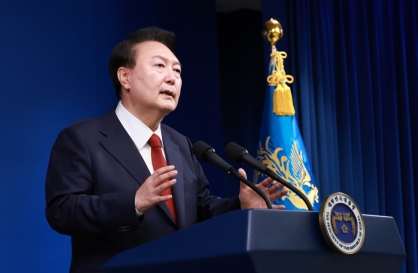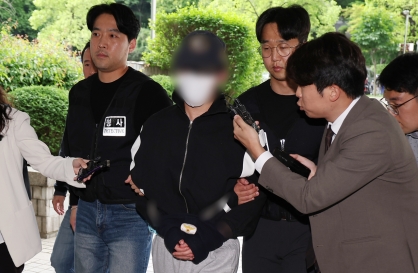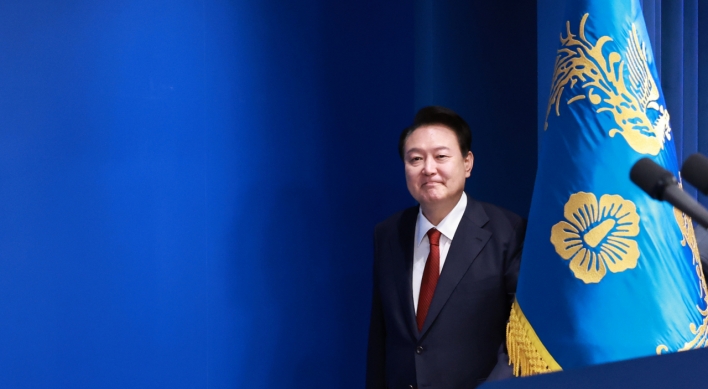Pressure builds on North Korea to give up nukes
Seoul, Washington point to differences in Iran, N. Korea cases
By Korea HeraldPublished : April 5, 2015 - 19:14
Pressure is building on Pyongyang to renounce its nuclear ambitions following last week’s preliminary accord to curb Tehran’s nuclear program, as Seoul and Washington underscore “differences” in Iranian and North Korean cases.
On Saturday, Seoul’s Foreign Minister Yun Byung-se said that the North was moving in a direction that was “diametrically different” from that of Iran, while criticizing it for sticking to its nuclear program.
“When progress has been made on the world’s nonproliferation efforts with a political framework agreed upon (to curb Iran’s nuclear activities), Pyongyang is adhering to its ‘byungjin line’ and rejecting denuclearization talks,” he said during a speech at a conference with South Korean diplomats.
Despite the continuing international criticism, the North has repeatedly vowed to keep its “byungjin line,” a two-pronged policy of simultaneously pursuing the development of nuclear arms and its economy until after the rest of the world including the U.S. is denuclearized.
Pyongyang, which defines itself as a nuclear power in its constitution, has also said that it would not engage in any denuclearization negotiations including the long-stalled six-party talks that involve the two Koreas, the U.S., China, Japan and Russia.
In contrast to the North’s explicit pursuit of nuclear arms, Tehran has argued that its nuclear program was designed for medical treatment, electricity production and other peaceful purposes, though the U.S. and other powers have doubted Iran’s claims.
Pointing to North Korea’s responsibility to take steps toward its denuclearization, Marie Harf, the acting spokesperson for the U.S. State Department, said that Iran and North Korean nuclear cases were “very different issues.”
“What Iran chooses to do or not do doesn’t have a lot of bearing on whether North Korea lives up to its international obligations,” she said during a daily press briefing last Friday.
“So we have said that if North Korea is open to coming back to the table in a credible way as part of the six-party talks, obviously, we believe the goal is the same. We need to get to a denuclearized Korean Peninsula. So the responsibility is on them, though, and regardless of what’s happening in other nuclear talks around the world.”
Meanwhile, officials from South Korea and other members of the six-party talks are expected to gather at a civilian forum in Japan in May to potentially discuss how to address North Korea’s nuclear problem.
Director general-level officials from the six countries may attend the Northeast Asia Cooperation Dialogue, a forum hosted by the University of California’s Institute on Global Conflict and Cooperation. The IGCC has reportedly sent an invitation to the North Korean delegation.
The six-party talks have been stalled since December 2008. Pyongyang had called for an unconditional resumption of the talks. But Seoul and Washington have claimed that for the talks to resume, the communist regime should first show its sincerity in its denuclearization commitments.
Angrily responding to the allies’ demands for “sincerity,” the North has said that it would not bargain away its nuclear arms.
By Song Sang-ho (sshluck@heraldcorp.com)
On Saturday, Seoul’s Foreign Minister Yun Byung-se said that the North was moving in a direction that was “diametrically different” from that of Iran, while criticizing it for sticking to its nuclear program.
“When progress has been made on the world’s nonproliferation efforts with a political framework agreed upon (to curb Iran’s nuclear activities), Pyongyang is adhering to its ‘byungjin line’ and rejecting denuclearization talks,” he said during a speech at a conference with South Korean diplomats.
Despite the continuing international criticism, the North has repeatedly vowed to keep its “byungjin line,” a two-pronged policy of simultaneously pursuing the development of nuclear arms and its economy until after the rest of the world including the U.S. is denuclearized.
Pyongyang, which defines itself as a nuclear power in its constitution, has also said that it would not engage in any denuclearization negotiations including the long-stalled six-party talks that involve the two Koreas, the U.S., China, Japan and Russia.
In contrast to the North’s explicit pursuit of nuclear arms, Tehran has argued that its nuclear program was designed for medical treatment, electricity production and other peaceful purposes, though the U.S. and other powers have doubted Iran’s claims.
Pointing to North Korea’s responsibility to take steps toward its denuclearization, Marie Harf, the acting spokesperson for the U.S. State Department, said that Iran and North Korean nuclear cases were “very different issues.”
“What Iran chooses to do or not do doesn’t have a lot of bearing on whether North Korea lives up to its international obligations,” she said during a daily press briefing last Friday.
“So we have said that if North Korea is open to coming back to the table in a credible way as part of the six-party talks, obviously, we believe the goal is the same. We need to get to a denuclearized Korean Peninsula. So the responsibility is on them, though, and regardless of what’s happening in other nuclear talks around the world.”
Meanwhile, officials from South Korea and other members of the six-party talks are expected to gather at a civilian forum in Japan in May to potentially discuss how to address North Korea’s nuclear problem.
Director general-level officials from the six countries may attend the Northeast Asia Cooperation Dialogue, a forum hosted by the University of California’s Institute on Global Conflict and Cooperation. The IGCC has reportedly sent an invitation to the North Korean delegation.
The six-party talks have been stalled since December 2008. Pyongyang had called for an unconditional resumption of the talks. But Seoul and Washington have claimed that for the talks to resume, the communist regime should first show its sincerity in its denuclearization commitments.
Angrily responding to the allies’ demands for “sincerity,” the North has said that it would not bargain away its nuclear arms.
By Song Sang-ho (sshluck@heraldcorp.com)
-
Articles by Korea Herald









![[K-pop’s dilemma] Time, profit pressures work against originality](http://res.heraldm.com/phpwas/restmb_idxmake.php?idx=644&simg=/content/image/2024/05/08/20240508050705_0.jpg&u=20240508171126)









![[Today’s K-pop] Stray Kids to drop new album in July: report](http://res.heraldm.com/phpwas/restmb_idxmake.php?idx=642&simg=/content/image/2024/05/09/20240509050659_0.jpg&u=)